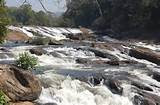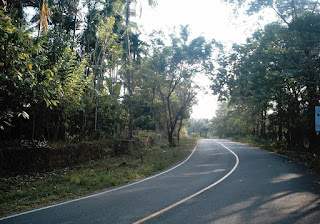Introduction
Dubbed as the Niagara of India, the Vazhachal and
Athirapally Waterfalls are the most important tourist attraction in the God’s
Own Country. The journey by road to the destination takes one initially through
a montage of villages and later through the pristine cover of forests that
offer a very cool and pleasant climate. The moment the vehicle passes from the
area of habitation to the beautiful forest cover, one can hear the rain gently
slapping the leaves of trees that hang out towards the road. The sudden change
of climate from a hotter to a cooler one in the forest area is a welcome
development for a visitor who wants to escape from the incessant heat of the
summer.
Beautiful Rainy Season
When we entered the forest zone from Chalakudy side, there
was drizzling, bringing the temperature further down. It seemed as if the birds
were silent, retiring to their homes on trees for the much needed rest. One
could easily imagine that they were anticipating an impending downpour. As we moved
more towards our destination, the speed and intensity of the rain picked up and
the rain drops tumbled down thick and fast, making the soil wet and marshy. The
smell of the rain was everywhere there to feel. As the rain became heavier, the
greenery surrounding the winding road through the hills picked up the grey.
Soon the darkness seemed to engulf the path through which we were travelling
due to dimmed lighting.

First-hand Account of Athirapally Waterfalls
Sooner we reached the destination in time for a good view.
However, there was a sea of humanity near the waterfalls. Hence, we decided to
tread a path seeking a secluded place far away from the loud noise which seemed
to mask the melodic sound of the roaring cascades. Soon, we found ourselves
walking along a path lined with trees and monkeys in search of a cool and calm
place near the waterfalls. After some efforts, we managed to find a silent
corner from where the Chalakudy River seems to flow down a height of 80 feet
into a small valley below it. This mysterious valley was fully covered with the
spray and the haze of the dazzling white of the body of water falling down.
While watching the white lather and experiencing the cool spray of water, we
wondered about the course of the river after this fall and the many moods it
would take in tune with the change of seasons. Sometimes, it remained a gentle
stream caressing through the rocks on its banks and at other times it roared
and thundered past these rock formations on its way to the sea, passing through
cliffs and crevices.
First-hand Account of Vazhachal Waterfalls
After we had wound up the sightseeing, the locals and the
small shop owners dotting the parking area near the Athirapally Waterfalls told
us about the existence of a bigger cascading falls uphill. From them, we also had
learned that Vazhachal Falls is located some 5 kilometres away from the first
one. When we reached there, it was an afternoon with lesser crowds dotting the
places near it. It looked a lot quieter and gentle from far off when compared
to the first one. However, the locals warned us not to venture near it as its
still waters run much deeper than what we could imagine. At this location, the
Chalakudi River seemed to slope against a rocky path and winding past the banks
of the forest taking the hues from it. When we climbed a little further from
the usual approach area, we saw the boards showing the presence of the Great
Indian Hornbill. The tropical green
forest surrounding the waterfalls provided the ideal habitat for this
colourfully winged creature. However, we could not see any one of them there.
A Memorable Journey from Vazhachal to Pollachi
As we moved away from the Vazhachal by road, we came across
verdant jungles and encountered some of the wildlife inhabiting the region. En
route to Pollachi, the forest cover became thicker and the rains heavier. As we were nearing the Anaimalai Hills, we
could see the patches of tropical evergreen forests and rolling tea estates coming
intermittently before our eyesight. While passing through this tough terrain,
we came across 40 hairpin bends that curved through the mountains taking us
closer to our destination. All throughout the journey, the river and the
reservoir seemed to follow us on one side and deep valleys on the other. The
region is known for the Nilgiri Tahr. While we were negotiating one of the
hairpin curves, we came across one of them crossing the road. We stopped at
some of the hairpins overlooking the valley below to visually grasp its beauty
and inhale fresh and cool air. At one of the assigned points, we were
instructed by the accompanying guide to step out and walk in the forest for
some time. When we were trekking up the
gradient, we came across the lion-tailed macaques, which are considered as the
endangered species, in open area. As we ventured further deep into the forest,
we came across a herd of Nilgiri Tahr raising their heads through the thickets.
Since it was evening time, we also saw the flying squirrels. They could be seen
jumping and gliding from one tree to another. As we were enjoying the sight of
flying squirrels, our eyes happened to accidently fall on parched Great Indian Hornbills.
A couple of them were seen sitting comfortably on the branches of the trees,
basking in the evening sunlight. We came down quickly and got into our vehicle
as it was raining heavily in the evening. A quick drive past a misty, marshy
land of ferns and orchids lead us to the first halting point in the journey
Valparai. This place is not only known for its hill station but also for the
tea plantations. This place is known as the bio-diversity hotspot of our
country. It has a lot of endemic and endangered species. After a brief stay, we
moved further away from Kerala and proceeded towards the Anaimalai Hills that
were more attractive and cool.









